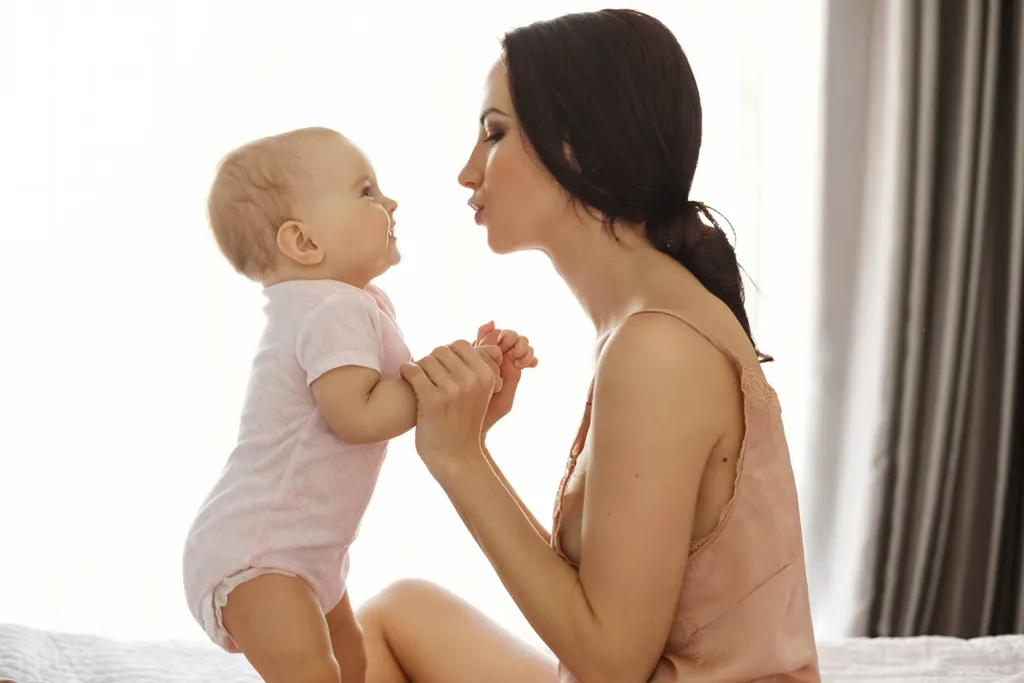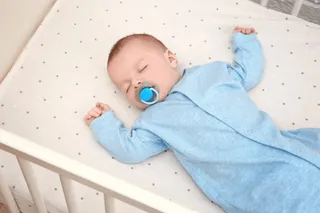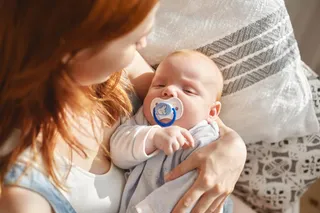15 Signs Your Baby Loves and Trusts You
Babies communicate love and attachment through eye contact, smiles, physical closeness, and playful gestures.

As a parent, you may sometimes wonder, “Does my baby really love me back?” It’s normal to feel curious about this, especially when your little one can’t use words yet. I remember feeling the same way with my own baby.
I also wanted to know about trust, because trust is so important in this stage of their life. Babies show us their love and trust in many small but powerful ways, and noticing these signs matters because it helps both you and your baby feel closer.
I’ll share what I’ve learned and experienced about how babies express their feelings, along with 15 signs that your baby loves and trusts you.
15 Signs Your Baby Loves and Trusts You
Even without words, babies have their own special ways of showing their feelings. Look for these signs:
1. Eye contact
When your baby looks into your eyes, it’s more than just seeing your face — it’s their way of bonding. From birth, babies are naturally wired to connect with loving parents, and eye contact is one of the first ways they show attachment (1).
Making eye contact helps babies build trust because they realize you are present and focused on them. Even very young babies enjoy gazing at their parents’ eyes, which gives them a sense of security.
As they grow, holding their gaze becomes an even stronger sign of connection. When your baby stares at you and smiles or coos, it’s their way of saying, “I know you, and I love being with you.”
2. Smiling
One of the first clear signs of love is your baby’s smile. Initially, newborn smiles may seem like mere reflexes. However, by around 6 to 8 weeks, babies start smiling intentionally, especially when they see their parents. I noticed this with my own baby during his second month celebration at the beach, where we had a lot of fun together and bonded deeply.
When your baby grins at you, it shows they recognize you as someone who makes them happy.
3. Extending their arms to be picked up
If your baby lifts their arms when they see you, it’s their way of asking, “Please hold me.” Babies quickly learn that being in your arms is a place of comfort and safety. This gesture shows both love and trust because they know you will respond.
4. Calming down in your presence
Sometimes a baby may be crying or fussy, like when my little one seems bored in his rocker for a long time and becomes upset. But the moment you pick them up — or even just come near — they start to relax, as if they’re content. This happens because your baby knows your touch, your smell, and even your heartbeat.
When they settle with you, it’s proof that you are their safe place. They trust you to comfort them when they are upset.
5. Turning to your voice
Have you noticed how your baby perks up or turns their head when you speak? Even before they can talk, babies recognize familiar voices and feel comforted by them.
Your voice is like a little anchor — they know it means safety, attention, and care. It’s amazing how something as simple as calling their name or humming a tune can make them focus entirely on you.
6. Cuddling into you
Some babies just love to snuggle, burying their face into your chest or shoulder. This isn’t only adorable. It’s a sign that they feel safe and want closeness. My baby often leans into me after a long day of new experiences, and it’s like he’s saying, “I feel safe with you.”
7. Imitating your facial expressions or sounds
Babies are little copycats, and they learn by watching you. When they stick out their tongue after you do, or try to mimic your coos and smiles, it shows they are paying attention and enjoying your company. This playful imitation is a way of connecting, learning, and showing affection all at once.
8. Looking for you in a room
Even at a young age, babies notice when someone familiar disappears. They might glance around, search the room, or even fuss until they spot you. This behavior tells you that they are forming a strong attachment — they want your presence nearby.
9. Showing separation anxiety when you step away
It’s normal (and actually a good sign!) when babies protest when you leave the room. Crying or fussing may feel inconvenient, but it’s their way of expressing how important you are to them. Around 6–9 months, this becomes especially noticeable [2]. Their distress isn’t about misbehavior — it’s proof that they rely on you.
10. Excited kicks and movements when you’re around
Sometimes babies show their happiness with big, wiggly movements. They kick their legs, wave their arms, or bounce in delight when they see you. I love watching my baby do this—it’s as if his little body is saying, “Yay! You’re here!” It’s pure joy and unmistakable affection.
11. Laughing with you
Laughter is a universal language of love. I love watching my baby giggle at our silly faces, funny sounds, or playful games. It’s his way of showing he’s fully present and enjoying our company.
After feeding and burping, my husband and I make it a point to have a few playful moments each day, making funny faces or singing little songs. He laughs, we laugh back, and those shared bursts of joy feel truly magical.
12. Melting peacefully in your arms
Have you ever held your baby and felt them completely relax, almost like they’re melting into you? I remember one afternoon after spending hours at the mall — he was tired, overstimulated, and ready for a break. As we walked to the car, I held him close, and he just melted into my arms, letting out a little sigh of relief.
13. Offering you toys or objects
Between 8 and 12 months, babies may start handing you toys or objects they enjoy. This is their way of reaching out and saying, “Look, I want to share this with you!” Even at this age, offering something shows they trust you and want to connect.
14. Seeking your presence when upset
Babies often look for comfort when they feel frustrated or unsettled. When your little one reaches for you, it’s a powerful reminder that they see you as their safe haven. Responding with calm, gentle words and a soothing touch helps them feel reassured.
15. Clinging to you around new people
When strangers or unfamiliar situations appear, your baby might hold tightly to you or hide their face. I noticed this during his 5-month birthday party — so many new faces and sounds all at once! He clung to me for comfort, pressing his little body close and peeking out only when he felt safe.
This is a completely natural sign of attachment. They trust you to be their safe base while exploring a new world. Moments like these remind you just how much your presence matters to them.
How to Strengthen Your Baby’s Love and Trust
One of the most important ways to help your baby feel secure is by consistently responding to their cues. Pay attention to signals — like when they’re tired, hungry, or need comfort. New parents can usually start noticing these signals within the first few weeks.
Also, in my experience, babywearing during the newborn stage really made a difference. With a soft, stretchy wrap, I could hold my baby close, and he fell into deep, calm sleep. That closeness helped him feel secure, and today he’s a happy, well-adjusted little boy!
Another powerful way to strengthen love and trust is through predictable routines. Babies feel more confident when they can anticipate what’s coming next, whether it’s feeding, naptime, or bedtime. Consistent routines help them know they can count on you, which reinforces trust and emotional stability.
Takeaways
The times you hold them close, respond to their needs, laugh together, or follow consistent routines are the building blocks of a lifelong bond!
Of course, parenting takes work. There are sleepless nights, fussy moments, and days that feel never-ending. But when your baby responds positively — snuggling in, smiling, or reaching for you — it fills your heart with joy.
FAQs
At what age do babies show love and trust?
Babies can show love and trust very early, sometimes within the first few weeks, by responding to your voice, touch, or smell. By 6 to 8 weeks, smiles and eye contact become clearer. Between 3 and 6 months, they cuddle, coo, and reach for you, and by 8 to 12 months, sharing toys, showing excitement, or expressing separation anxiety are strong signs of attachment.
Can babies feel when you love them?
Absolutely! Babies are highly attuned to your presence, tone of voice, and gestures. By comforting them, cuddling, and responding to their cues, you help them feel nurtured.



